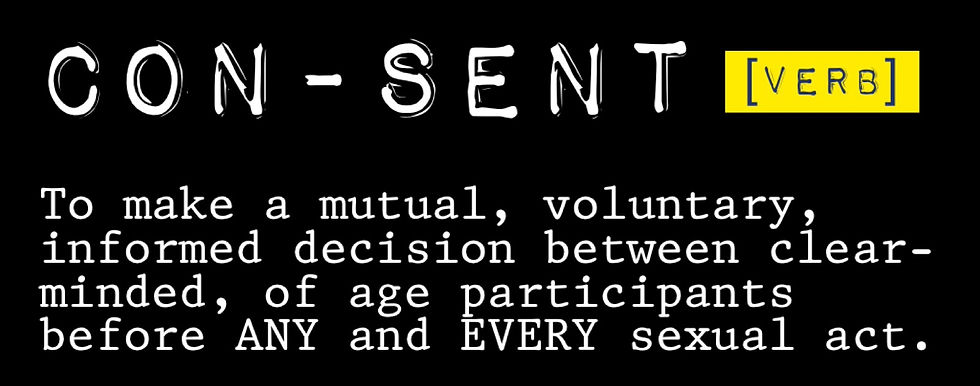
Last week, the internet exploded with anger over the extremely lenient sentence given to Brock Turner, who was convicted of three felonies related to his assault of an unconscious woman. When letters written by his father and a childhood friend were released, the outrage only grew, as both seemed to dismiss the assault as not really rape. His father went so far as to describe the assault as non-violent and “20 minutes of action.” His friend blamed Turner’s conviction on “political correctness” and claimed that this was really about college students drinking too much.
It’s all too easy to dismiss these letters as aberrations. In reality, these sentiments are common in our society. So let’s take a look at what consent actually is.
Consent is….
Active: silence is not consent. The absence of no is not consent. A person has to actively say YES or otherwise communicate consent.
Sober: a person who is drunk or on drugs cannot consent to sexual activity.
Based on Equal Power: a person who is underage, asleep, of lower mental capacity or otherwise vulnerable cannot consent to sex.
A Choice: consent is not based on pressure, coercion, threats or physical threats.
Enthusiastic: you should aim for getting a “yes” instead of just avoiding a “no.” Only have sex if your partner WANTS to have sex with you!
A Process: consent requires an ongoing conversation; just because a person consents to one sexual activity does not mean that they consent to other sexual activities. Talk to your partner!
Consent is not….
Based on What a Person Is Wearing: revealing clothes cannot consent to sex. Only a person can do that.
Silence: just because a person is silent does not mean that they are consenting. If it’s not yes, it’s no.
Drunk/High: an incapacitated person cannot consent.
Unconscious: an unconscious person cannot consent.
Coercion: if someone is pressured or threatened, then they have not truly consented. It isn’t consent if you make the other person afraid to say no.
Implied from Past Encounters: just because someone once agreed to have sex with you (or even if they agreed to marry you), does not mean that they have consented to any future sexual activity

Consent should be given freely and enthusiastically, without pressure or fear. It involves communicating with your partner (or potential partner), and listening to them. Most importantly, sexual contact without consent is rape (or sexual assault).
Sexual violence is pervasive in our society. Education is one of the ways that we can achieve our goal of reducing sexual assaults — and that includes education on consent. If you’d like to get involved in our mission to end all forms of gender violence, click below to volunteer, donate or join one of our advocacy groups.
Learn More:
